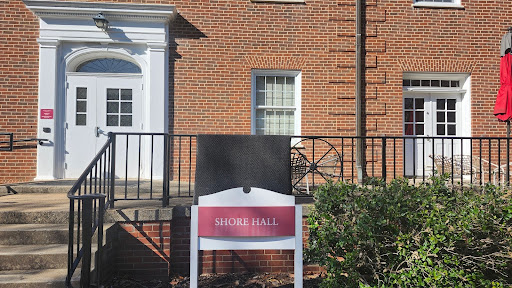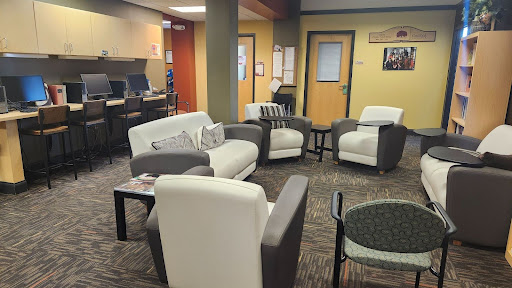On March 27, Hodgins Retreat developer Randall Dixon drafted a proposal to extend the apartment complex adjacent to campus.
Denied once by the Zoning Commission in December 2012, Dixon seeks to merge the Hodgins property with 2.89 acres of the neighboring private property. Partnering with Burkely Community president Sterling Kelly, Dixon plans to build 64 more apartment units on the rezoned land.
As a result, a rezoning battle is now underway involving the wooded neighborhood.
“The plan itself looks like it’s encroaching on our campus,” said senior and Hodgins resident Austen Applegate. “That doesn’t serve us well.”
Director of Student Life Susanna Westburg agrees that development will impact Guilford’s aesthetic value.
“Many in the Guilford community take pride in the green space surrounding our campus,” said Westburg. “Additional construction would interfere with that atmosphere and campus feeling.”
The proposed construction — five buildings and a parking lot — would occupy the wooded area bordering the baseball field and the Guilford College Lake.
“I really enjoy waking up, looking out my window and seeing woods,” said Applegate. “Guilford is surrounded by woods, and this development would destroy that.”
As discussion between Dixon and the Zoning Commission continues, some student residents do not recall being informed of the proposal.
“Development? They haven’t even told us,” said senior Akeem Porteous. “But I doubt this will ever go through. It’s ridiculous.”
While students are the crucial stakeholders, alumnus David Feagins ’70 plays an active role in expressing community concerns about the expansion.
“I’ve lived on this campus 60 of my 65 years,” said Feagins. “It’s a shame that they’re doing this. We truly are one of the few colleges today who can say this is a green campus.”
Feagins also stressed the project’s potential threat to Guilford’s ecosystem.
“Whenever you construct a parking lot of that magnitude, you’re going to get storm water runoff,” said Feagins. “Once the runoff escapes the lone filtration system, it’s headed right down to Guilford College Lake.”
Feagins is not the only one alarmed.
Neighbors of campus fear that development will open doors for environmental and traffic hazards.
“It goes without saying that construction is harmful to the environment,” said Twinkle Patel, employee of BP Gas on West Friendly Avenue. “Besides, it’s already too busy around here.”
“Construction will increase commercial traffic with builders coming in daily,” said Jonathan Isaacs, technician for Friendly Tires. “It will get noisy and definitely distracting for students studying.”
Many senior students and alumni see the current rezoning battle in light of the initial Hodgins development.
“I remember a Guilford before Hodgins,” said a former Hodgins employee who wishes to remain anonymous. “People were not happy when the original buildings went up.”
“The majority of residents along Foxwood were opposed,” said Feagins. “It didn’t matter. The proposal got through, and the land was zoned.”
If history tells us anything, it is that Dixon may well have his way in the end.
“(Dixon) intends to file a new rezoning request … but is still working with neighbors and interested parties on an updated proposal,” said Planning and Community Development Administrator Mike Kirkman in an email interview.
Feagins, who recently attended a meeting with Kirkman and the developers, stated that the developers “have pretty much received approval to move forward.”
Seldom taking a position on newly proposed construction, the college administration did not comment on the recent news.
“We have not been active in this in the recent weeks but plan to reform a position as things have changed,” Vice President of Administration Jon Varnell said in an email interview.
The administration and board of trustees will meet later this month to finalize a stance.
Jim Newlin, alumnus and co-founder of the West Friendly Avenue-Guilford College Alliance, urges students to actively engage in local planning.
“Students can and ought to be involved in the strategic planning process,” Newlin said. “We are planning to develop a comprehensive plan to address these issues, but more recently, we’ve been focusing on the issues surround Hodgins Retreat.”





